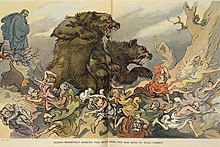Interstate Commerce Commission
[2]: 42ff Other potent issues included alleged attempts by railroads to obtain influence over city and state governments and the widespread practice of granting free transportation in the form of yearly passes to opinion leaders (elected officials, newspaper editors, ministers, and so on) so as to dampen any opposition to railroad practices.
Various sections of the Interstate Commerce Act banned "personal discrimination" and required shipping rates to be "just and reasonable."
[3] The Commission had a troubled start because the law that created it failed to give it adequate enforcement powers.
[8] A long-standing controversy was how to interpret language in the Act that banned long haul-short haul fare discrimination.
[10][11] The Esch-Cummins Act of 1920 expanded the ICC's rate-setting responsibilities, and the agency in turn required updated valuation data from the railroads.
[17] The Transportation Act of 1920 directed the Interstate Commerce Commission to prepare and adopt a plan for the consolidation of the railway properties of the United States into a limited number of systems.
Between 1920 and 1923, William Z. Ripley, a professor of political economy at Harvard University, wrote up ICC's plan for the regional consolidation of the U.S.
Numerous hearings were held by ICC regarding the plan under the topic "In the Matter of Consolidation of the Railways of the United States into a Limited Number of Systems".
[22] Although racial discrimination was never a major focus of its efforts, the ICC had to address civil rights issues when passengers filed complaints.
[29] Some economists and historians, such as Milton Friedman assert that existing railroad interests took advantage of ICC regulations to strengthen their control of the industry and prevent competition, constituting regulatory capture.
[34] Based on his own testimony and that of a Massachusetts congressman,[34] Boynton won release on May 28, 1920, overcoming testimony of the ICC's chief clerk that Boynton was virtually a daily visitor at ICC offices, seeking Commission adoption of his proposal to revolutionize the railroad industry.
Surface Transportation Board (STB), which reviews mergers and acquisitions, rail line abandonments and railroad corporate filings.
Prior to its abolition, the ICC gave identification numbers to motor carriers for which it issued licenses.
And, like the ICC, later agencies tended to be organized as multi-headed independent commissions with staggered terms for the commissioners.
However, these provisions have largely not been put into practice; the Commission existed between 1913–1920, and 1975–1989, but never assumed the role which Australia's founders had intended for it.

